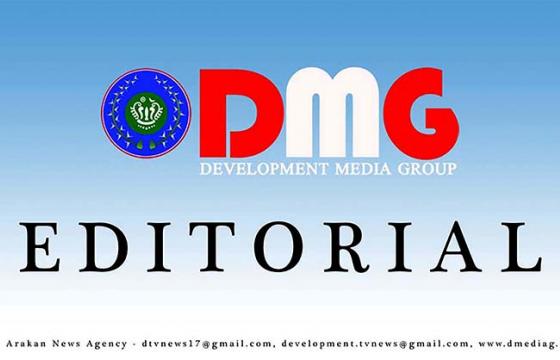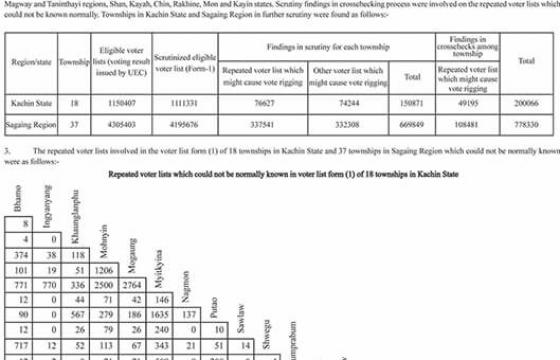During these few days Aung San Suu Kyi’s initiated 21 Century Panglong Conference (21CPC) has gained momentum, as could be seen by her peace chief negotiator Dr Tin Myo Win’s meeting with the United Nationalities Federal Council (UNFC) leadership in Chiang Mai on 3 June, followed by the latter’s team visit to Yangon , headed by Khu Oo Reh, reportedly said to have asked for a clear position of the government on certain issues and working out the details for the UNFC boss General N’Ban La to meet her.
Meanwhile, Suu Kyi has met the 8 Ethnic Armed Organizations (EAOs) that have signed the Nationwide Ceasefire Agreement (NCA) and sent a clear message that she and her party has no hidden agenda in trying to install a federal system of government that would lead to national reconciliation.
Commander-in-Chief Min Aung Hlaing meeting with the 8 EAOs that followed was also said to be cordial, although he seemed to put the blame on the non-signatory EAOs or UNFC for failing to agree to ink the NCA, aside from dodging the question of 3 excluded EAOs, Myanmar National Democratic Alliance Army (MNDAA) or Kokang, Ta’ang National Liberation Army (TNLA) and Arakan Army (AA), that he insisted must first surrender to be able to participate in the peace process.
Let us ponder on this good will message of Suu Kyi, while trying to read the message of Min Aung Hlaing, whether they are conducive in creating an atmosphere to the peace process.
Furthermore, statement of other players like Khu Oo Reh, Hkun Htun Oo , U Aye Thar Aung and Sao Hkun Hseng will be touched on, to reflect the contemporary political development of Panglong-like conference scheduled to be held soon, which is dubbed as the 21 Century Panglong Conference (21CPC) by Suu Kyi.
Aung San Suu Kyi
State Counsellor Aung San Suu Kyi and the leaders of the Peace Process Steering Team (PPST) , made up of 8 EAOs that signed the NCA, held a meeting at the Horizon Lake View Hotel in Naypyitaw, on June 28, and decided to hold the Union Peace Conference (UPC) also known as the 21CPC by August.
She said: “We are happy to be able to meet (each other). This is our first meeting and very important to have a good start, so that the ending phase would be also secured. To have a good start, we all need to have a sense of cooperation so that it could be successful. I trust that we have this kind of spirit. Our government has a very simple ambition, without hidden agenda. We only aim to build a federal union where all our citizens could live happily in prosperity. I would like to invite all to help realize this aim.”
Other than that she talked about the importance of committed political will and that she understood the worries of the ethnic nationalities, which is connected to the transitional change. But pointed out that these worries could be overcome, if there is trust, for trust could negate worries.
She went on to say that all valuable things are not easily achieved and called for cooperation to make the formation of federal union happens. She particularly stressed that 70 years of civil strife is far too long and that all must leave a legacy of peace for the generation to come, by making it happen through the culture of “give” rather than “take”.
Min Aung Hlaing
Following the meeting with Suu Kyi, the PPST met with Commander-in- Chief Min Aung Hlaing on the same day, at 2 pm Bayintnaung Parlour, in Naypyitaw.
Present at the meeting were Deputy Commander-in-Chief of Defence Services Commander-in- Chief (Army) Vice-Senior General Soe Win, senior military officers of the Office of the Commander-in-Chief (Army), members of the PPST—Chairman of Karen National Union (KNU) Saw Mutu Sae Poe, Sao Pong Khur of Restoration Council of Shan State/Shan State Army (RCSS/SSA), Patron Khun Okker of Pa-O National Liberation Organization (PNLO), Chairman of Chin National Front (CNF) Pu Zing Cung, Vice Chairman of Arakan Liberation Party (ALP) Khine Soe Naing Aung, Naw Kapaw Htoo of Karen National Liberation Army (Peace Council) KNU/KNLA, Chairman U Than Khe of All Burma Students’ Democratic Front (ABSDF), Saw Mo Shae of Democratic Karen Buddhist Army (DKBA) and delegation members.
According to Min Aung Hlaing’s Facebook and recent report of Myawady News, the military mouthpiece, he said that all parities concerned, both NCA signatories and the majority non-signatory EAOs should cooperate according to “the Union spirit” or “Myanmar spirit” without holding on to “dogmatism,” only then “victory” will be achieved peacefully and speedily.
Among others, he stressed:
- His thankfulness of the 8 EAOs for their constructive cooperation in signing the NCA;
- The need for all EAOs (signatory and non-signatory) to work in unity towards peace;
- The importance of responsibility, accountability and sense of duty to the country;
- The invitation for the non-signatory EAOs to sign the NCA;
- The UPC or 21CPC participation of the non-signatory EAOs rest on the wishes of government, respective parliaments, political parties, ethnic nationalities’ consideration, and not just on the military alone;
- The non-signatory EAOs should have confidence, work through the political process and refrain from expanding territories, building strongholds and expanding their forces out of concern; and that
- The military honestly, absolutely did not want to fight between national brethren, but it has to protect the respective administrative mechanisms, and lives and property of people from threats and dangers.
However, the question of the excluded 3 EAOs – MNDAA, TNLA and AA – that have been delivering running battles with the military, participation in the peace process remains unresolved, as the Commander-in-Chief would not take a concrete stand on it. He has on a lot of occasions insisted that the the 3 EAOs have to surrender first, before they could be part of the peace process.
United Nationalities Alliance Meeting
The United Nationalities Alliance (UNA), which is made up of 12 ethnic political parties, including the Shan Nationalities League for Democracy, the Mon National Party, Kayan National Party, Kayin National Party, Rakhine National Party, Shan State Kokang Democratic Party, Zomi Democracy Federation, Kachin National Democracy Congress Party, Khume (Khami) National Party, Rakhine Patriotic Party, Mro National Democracy Party and Danu Nationalities Democracy Party, met from 30 June to 2 July to prepare for the 21CPC. The gathering was also attended by Naw Zippora Sein, Vice-Chairwoman of Karen National Union (KNU) and Sao Hser Hten, patron of the Shan State Progress party/Shan State Army (SSPP/SSA), which is titled “Drafting Key Principles and Characteristics for Federal Union of Burma/Myanmar”.
According to RFA video report of 2 July, U Aye Thar Aung of Arakan national Party (ANP), who is also the Deputy Speaker of upper house or Amyotha Hluttaw, said that in order the 21CPC to be successful, it would need to adhere to the principles of tripartite dialogue; sticking to the 1947 Panglong Agreement; and implement all-inclusiveness regarding the EAOs.
Firstly, he explained that tripartite dialogue composition should include:
- EAOs, Ethnic political parties and ethnic leaders;
- Political parties and democratic forces;
- Government, the military (Tatmadaw) and the parliament.
Secondly, the 21CPC must take into account the treaty of 1947 Panglong Agreement. They are:
- Equal, voluntary cooperation or fusion of the ethnic states;
- Rights of self-determination and self-governance; and
- Rights of secession, when the particular ethnic group so desired.
Hkun Htun Oo, Chairperson of the UNA also said during the gathering that 21CPC would only be successful if the 8 constituent units is applied and not 14 units, as preferred by the military, many Bamar politicians and perhaps quite a number of Bamar political parties. He stressed that there could be no check and balance in 14 units configuration, as the Bamar will be holding the majority vote as owner of the 7 Divisions or Regions, as they are now renamed.
In addition, Naw Zippora Sein said: “ From the part of ethnic nationalities, I see that we need preparations regarding the type and facts on federal union formation, so that when attending political discussions or negotiations the EAOs and ethnic political parties could come out with one voice, as our aspirations are one and the same.”
She said the result from the meeting should be tabled before the public (and discuss), so that they will be involved, which is crucial.
Dr Manam Tu Ja of the Kachin State Democracy Party also told the media that the meeting tried to adjust on the issues of “the three parliaments, central (union) government, state governments and self-administrative zones; union constitution and state constitution; power-sharing between the union and state governments; overlapping powers of federal (union) and state governments; and residual power of the state governments” among the ethnic political parties that were preparing a common draft. He said they were able to bridge the differing views of the issues.
Khu Oo Reh
Head of the Delegate for Political Negotiation (DPN) and general secretary of the UNFC confirmed that a meeting would take place with State Counsellor Aung San Suu Kyi in mid-July. The agreement was reached during a meeting between the UNFC and the government’s team led by Dr. Tin Myo Win at an office of the National Reconciliation and Peace Center (NRPC) in Rangoon on 1 July. It was said UNFC leaders including its chairman N’ Ban La would be attending the meeting.
He, however, said, “It is not time yet to answer whether we will attend it [the Union Peace Conference]. We still have procedures which must be followed, including the Mai Ja Yang summit. We can only decide how we will participate after the summit. We have to find an answer in Mai Ja Yang.”
The UNFC members and other armed groups – that have signed NCA including non-UNFC armed groups – are planning to meet in Mai Ja Yang, Kachin State later this month to discuss on how to go about the Union Peace Conference or 21CPC, slated to be held in August.
The UNFC, which is made up of nine ethnic armed groups, did not sign the last year’s nationwide ceasefire agreement, while 8 armed groups signed the pact with the ex-president Thein Sein’s quasi-civilian government.
Sao Hkun Hseng
Regarding the 21CPC, what Sao Hkun Hseng, Vice-Chairman of the SSPP/SSA told the DVB on 22 June video interview is particularly noteworthy.
He said: “ By using the word Panglong, the question arises whether the 1947 Panglong Agreement, signed on 12 February, is being accepted. It must be made clear it this is the case and if not the government should explain and make it clear its reason to all, including the ethnic armed movements, which all are eager to hear.”
He stressed that the 9 point Panglong Agreement has to be included and the 1947 Union of Burma Constitution also has to be accepted. As the Charter of the United Nations is unchangeable, the Panglong treaty or agreement could not also be changed.
He criticized the lower house or Pyithuhluttaw Speaker U Win Myint for wanting to first tackle the national reconciliation, before going for constitutional amendment. He said that it is like putting the cart before the horse, for the country’s political strife is due to the unfair and inadequate constitution, which has led to the ongoing ethnic conflict, and has to be addressed first.
He urged that the government to declare unilateral ceasefire and all the EAOs would definitely follow suit, further elaborating that the exclusion of the 3 EAOs – MNDAA, TNLA and AA – and asking them to surrender is uncalled for and should be allowed to participate, to show equality.
Analysis
Looking at the political development of these few days, one could pin point a couple of areas that need emphasizing.
Firstly, it is the usage of the “Panglong” by Aung San Suu Kyi, without explaining in depth on how she and her party would like to go about in instilling a national reconciliation atmosphere.
Panglong Agreement is connected to 1947 Union of Burma Constitution and they in turn spelled out the federal system of government, although not flawless at that time, that was supposed to be vested with equality, rights of self-determination and democracy.
The ethnic nationalities tried to correct the constitutional flaw of 1947, with the Federal Amendment Proposal drawn by all ethnic nationalities in unison in 1961, in Taunggyi, Shan State.
The major flaws were inadequate power-sharing and resources-sharing and the proposal seeks to make Bamar ethnic group to be on a par with the other ethnicities, which was usurping the union government power and ruling over the whole country, without having its own state like the others. This trend continue starting from 1962 military coup until today.
Suu Kyi and NLD have no blueprint, or keeping it secret, on how to go about this constitutional crisis, other than than just a vague commitment of going to form a federal union. As such, the ethnic nationalities are at lost on how she and her party is positioned on the crucial power-sharing and resources-sharing issues. Hkun Htun Oo even bemoaned recently during the ethnic political parties’ meeting that it was frustrating not to know where the NLD stood, regarding the constitutional amendment position, which would be a waste of time in preparing without detailed knowledge of the government’s party position for the upcoming conference, from the part of the ethnic nationalities.
It is all the more becoming a guessing game as the military now also said that it is for a federal form of government, which it has all along equate it with secession, without elaborating how it envisioned the system should look like.
The standard answer from both the NLD and the military camp is that all stakeholders would come around, discuss and make a decision together on how a chosen federal system would look like.
But it is not enough for the ethnic nationalities, as most are inclined to stick to the Panglong Agreement, 1947 Union of Burma Constitution and the 1961 Federal Amendment Proposal as their outgoing point to work out a federal constitution with the Bamar political class and as well, the military.
While it is clear that the military wants a Bamar-dominated unitary system with some devolution of power for the ethnic states, the NLD position is not clear, as it has no blueprint, never make it known or spelled out its party position.
It should be noted that in a matured democracy, a major party of NLD stature needs to have position paper on such crucial issue like constitutional amendment not just wishy-washy. Even if the NLD regime could argue that it has to be broad-minded and allow all stakeholders express their positions first before embarking on a political system, as a party it still must have a program. There is absolutely no excuse on this and should develop its party position, including making it known to the public. Otherwise, it won’t be worthy or appropriate to be taken as a nationwide, democratic party that it is striving to portray.
Secondly, the UNA, even if it has not yet finished its position paper, has already spelled out on some crucial points as U Aye Thar Aung and Hkun Htun Oo have made it known, during the ethnic political parties gathering.
They have touched on the issues of how the 21CPC should be equally represented, the inclusion of the 1947 Panglong Agreement’s commitments, 8 constituent units versus 14 units and even the rights of secession.
As the national reconciliation deliberations unfold, the question of NLD’s clear-cut position on nation-building process becomes more important than ever. And it is now clear that Aung San Suu Kyi and NLD could not dodge this issue by simply saying, “we will all decide on what kind of political system we prefer”. As a national party it has to come up with a clear vision and not shy or afraid to spell it out. But this is not to say that the NLD suggestions would be heeded and accepted without question. Of course, all stakeholders will be involved in the negotiation and decision-making.
Finally, as the ethnic nationalities have made their point clear on what they expect from the forthcoming Panglong-like convention in building a federal union, the NLD and Aung San Suu Kyi also should do likewise and make their point of view known to the public.






